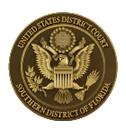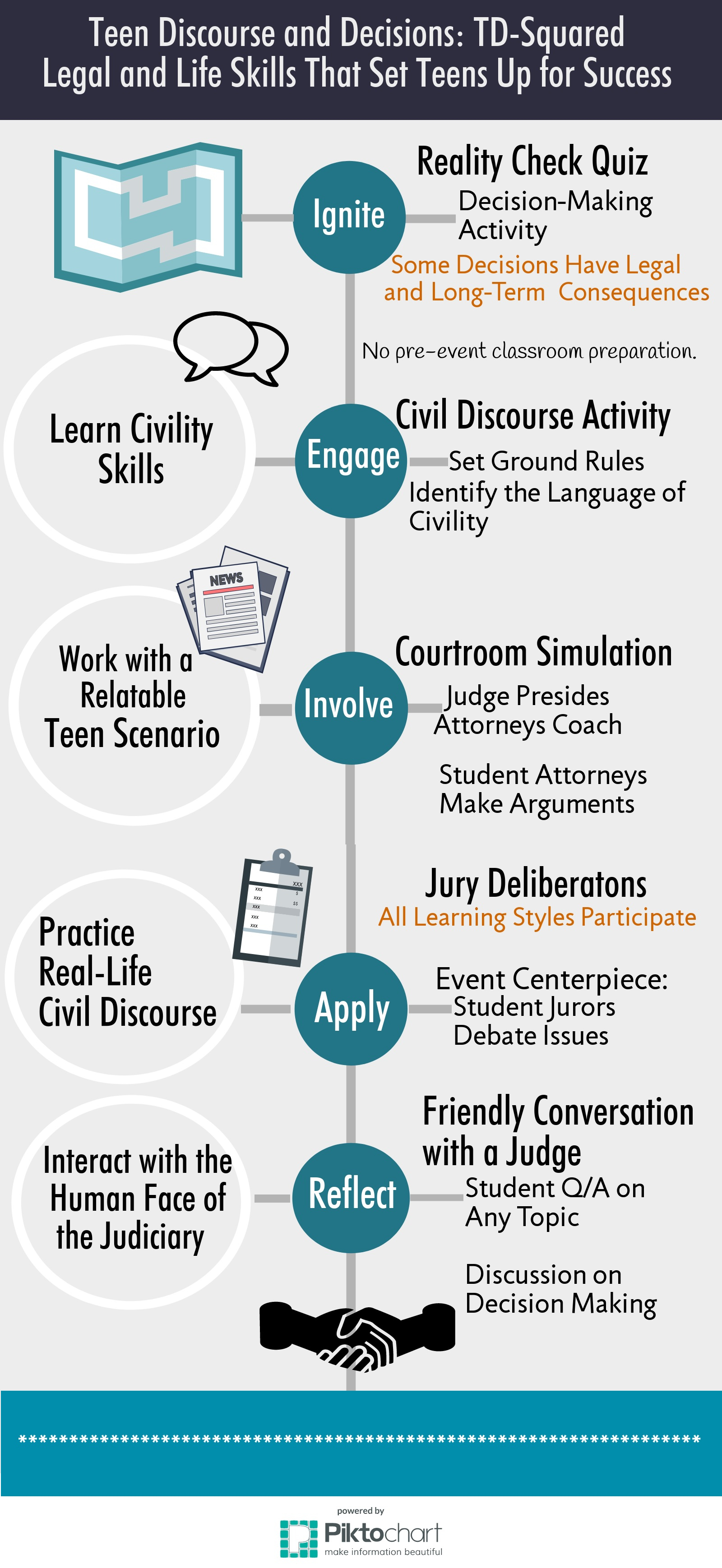Judges and Lawyers Bring Law Day to Hundreds of South Florida Students
Judges and Lawyers Step Up to Provide Distance Learning During COVID-19 Crisis
Civil Discourse and Difficult Decisions
Civil Discourse and Difficult Decisions Activity
Program at Palm Beach State College
Judges Teach Civility as a Legal and Life Skill
Photos from Civil Discourse and Difficult Decisions Events
Program Description
Background
The Federal Courts' Unique Niche in Civics Education: Courtrooms, Judges, Lawyers, Teens and their Issues
These courtroom and classroom activities apply contemporary Supreme Court cases to today’s teen issues, creating the federal courts’ unique niche in civics education. Court simulations offer real-life experiences with judges and attorneys at local federal courthouses. All learning styles are involved in the courtroom action and, most importantly, in jury deliberations and judicial sentencing decisions. The activities are supported by interactive web resources and multi-media tools, including videos and podcasts on court fundamentals. These original, courtroom-ready and classroom-ready simulations are the centerpiece of a national pilot program to build teens’ decision-making capacities, to equip them with civil discourse skills, and to introduce them to the human face of the judiciary. The U.S. District Court judges of the Southern District of Florida are the first to undertake the pilot, facilitated by U.S. District Court Judges Robin L. Rosenberg and Beth Bloom. Ultimately, these real-life experiences expose young people to the way courts and communities come together in courtrooms to work out disputes through civil discourse and reasoned decision making – the same skills students practice in these courtroom simulations. The participants’ real-world immersion in the courts is designed to motivate young people to become part of the process in any of a number of roles inside and outside the justice system and to inspire them to serve on juries willingly when called.
Civics Day Program in the Southern District of Florida on September 22, 2021.
This year, the Southern District of Florida welcomes the Federal Bar Association to Miami for the FBA Annual Meeting and Convention. On September 22, 2021, Judges and attorneys will share civil discourse skills and discuss constitutional issues with students in Miami-Dade, Broward and Palm Beach County public high schools in a “Civil Discourse and the Constitution” program. This program is an extension of the “Civil Discourse and Difficult Decisions” program. Students will practice civility as a legal and life skill through candid conversations on the value of the rule of law in protecting their rights. The Civil Discourse and Difficult Decisions program was created and piloted by the Southern District of Florida five years ago. This program is now used by the Administrative Office of the U.S. Courts and other district courts throughout the country. Additionally, the Federal Lawyer just featured the Civil Discourse and Difficult Decisions program in its current issue, Page 19: https://www.fedbar.org/blog/magazine/july-august/
For more information about Civics Day, please visit the following websites:
Federal Bar Association (FBA): https://www.fedbar.org/event/civics-day/
Care Academy
The Southern District of Florida hosted school children from CARE Elementary School for a tour of the U.S. District Courthouse and a day of learning about the legal system. At the Wilkie D. Ferguson U.S. Courthouse, students were able to participate in an interactive tour through the U.S. Marshal’s Office, a Judge’s private chambers and public courtrooms. Students were able to gain knowledge of the court process by participating in a mock trial with Senior United States District Judge Donald Graham. The trip to the courthouse reiterated the school’s mission of preparing confident, lifelong learners and responsible citizens.
Opportunities like this one enrich the educational experience for school age children and expose them to career choices that are available if they set goals and work toward a strong academic foundation. This special learning opportunity was made possible through coordinated efforts provided by Senior United States District Judge Donald Graham and his chambers, Mrs. Devona Perez and the Caribbean Bar Association.
Naturalization Ceremonies
Naturalization ceremonies are public events that bring communities, schools, and new citizens together in federal courthouses. These ceremonies allow students to observe or participate in a citizenship ceremony and learn more about the federal courthouse. For more information, click here. Space is limited.
CARE Court
The Court Assisted Re-Entry program (CARE Court) was established to help reduce recidivism by assisting moderate and high-risk offenders to successfully reintegrate into their families and community. Successful reintegration usually includes obtaining stable housing and stable employment. Started in 2016, CARE Court provides additional judicial oversight and intensive supervision to offenders. To aid in reintegration, CARE Court helps connect participants with service providers that can aid with things such as job skills training, job placement, legal assistance, and housing.
CARE Court is operated by a team of court professionals, including a presiding District Court judge, members of the U.S. Attorney’s Office, members of the Federal Public Defender’s Office, and United States Probation Officers. CARE Court participants meet every other week with the CARE Court Team. At the meetings, the participants and the Team discuss the participant’s progress toward reaching the goals the participant set at prior meetings and new goals are set. Goals might include completing a GED, reinstating a driver’s license, or obtaining a job. Issues that have impeded a participant’s ability to reach his or her goals are also addressed and strategies for overcoming the impediment are discussed.
A participant graduates from CARE Court after having earned 75 points. Points are awarded for attending CARE Court and for reaching the goals set by the participant and CARE Court team. Upon graduation, a participant’s term of supervised release is reduced by 12 months.
Law Day
Law Day is an annual celebration of the rule of law in a free society. Throughout May, the legal community reaches out in communities across the nation to simulate appreciation and critical thinking about the founding fundamentals that are so easily taken for granted.
Since 1958, when President Dwight D. Eisenhower established the first Law Day, Americans have taken the opportunity to recommit themselves to remaining a nation of laws. The observance became official in 1961, when Congress issued a joint resolution designating May 1 as Law Day.
Speeches, gatherings, and programs for adults and students set the stage for a month-long exploration of enduring legal principles. Many federal courts open their doors in May to bring the next generation of jurors into courtrooms to see and to participate in the process of justice for all.
Constitution Day
The anniversary of the Constitution's signing is observed officially on September 17, and courts celebrate it throughout the month with naturalization ceremonies and other educational outreach events to help schools fulfill a congressional mandate to teach about the Constitution.

